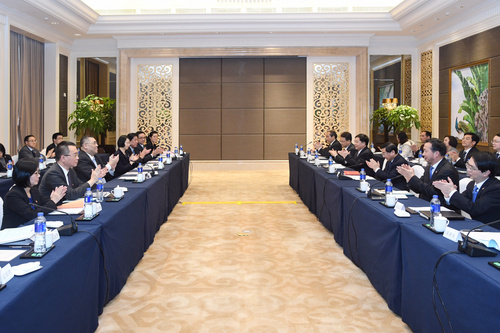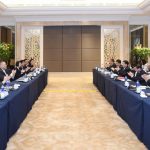 The Fujian-Macao high-level meeting on the development of the “Belt and Road” initiative takes place in Fuzhou Prefecture, Fujian Province.
The Fujian-Macao high-level meeting on the development of the “Belt and Road” initiative takes place in Fuzhou Prefecture, Fujian Province.
Macao would dedicate further effort to boosting trade and investment cooperation and people-to-people exchanges with Fujian Province, in order to make further contributions to the country’s “Belt and Road” initiative.
The Chief Executive, Mr Chui Sai On, made the remarks in Fuzhou Prefecture, Fujian Province in his two-day visit. He was speaking to reporters after attending a Fujian-Macao high-level meeting on the development of the “Belt and Road” initiative.
Mr Chui and the Governor of Fujian Province, Mr Yu Weiguo, respectively led at the meeting delegations drawn from their governments. Discussions included how to advance joint efforts for the development of the “Belt and Road” initiative and how to quicken the pace of complementary cooperation in several fields.
Macao’s involvement in the country’s development of the Silk Road Economic Belt and the 21st-Century Maritime Silk Road (collectively known as the “Belt and Road” initiative) is part of the city’s strategic development programme.
Macao – with its close ties to Portuguese-speaking countries – would take a greater role in boosting Fujian’s, and Southeast Asian countries’ cooperation with those places regarding the “Belt and Road” initiative, it was proposed at the meeting.
The discussions also made reference to Macao’s strategic position as a commercial and trade cooperation service platform between China and Portuguese-speaking countries; and raised the issue of how to make the best use of the support on offer from the Central Government regarding such matters.
Mr Chui highlighted other ideas for boosting trade and investment cooperation between Fujian and Macao, including: further promotion of the “Belt and Road” initiative in Macao’s major events and conferences; and to take advantage of Macao’s international network of contacts in order to advance jointly with Fujian further cooperation and investment on ecological protection and environmental industries.
To boost people-to-people exchanges, the two places planned to promote internationally the tourism offer of Fujian and Macao – as a route to enriching tourism cooperation among places covered by the “Belt and Road” initiative. They also planned to: intensify cooperation on traditional Chinese medicine; encourage further exchanges among young people and returned overseas Chinese; and promote A-Ma culture, particularly in relation to the task of securing the listing of the culture as an element of intangible heritage, and in preserving such culture.
Fujian-Macao collaboration regarding the development of the “Belt and Road” initiative would provide a great number of complementary benefits, said Mr Chui. Fujian Province is a core area for the development of the 21st-Century Maritime Silk Road, and Macao has its own advantages, particularly in relation to its links with Portuguese-speaking countries.
Planned cooperation projects for enhancing Fujian-Macao involvement in the “Belt and Road” initiative included:
- the establishment by year-end in Macao of the headquarters of the China-Portuguese-speaking Countries Cooperation and Development Fund;
- the issuing of invitations to officials from the countries and places covered in the “Belt and Road” initiative to join the 8th International Infrastructure Investment and Construction Forum, an event to be held in Macao in June, and;
- the issuing of invitations to Macao associations for returned overseas Chinese for their participation in the Dynamic Macao Business and Trade Fair, an event to be held in Quanzhou Prefecture, Fujian in June. Quanzhou’s groups for returned overseas Chinese would also play a role in the event.
While in Fuzhou today, Mr Chui also met with the Secretary of the CPC FujianProvincial Committee, Mr You Quan, to discuss the closer partnership of the two places, particularly in relation to opportunities arising from the “Belt and Road” initiative.
Mr Chui said Macao’s economy had become more stable as a result of the adjustment period experienced by the city’s gaming industry over the past two years. Assisting the development of the country’s “Belt and Road” initiative would further Macao’s efforts to diversify its economy and ensure the city’s economic sustainability.
Fujian is the first mainland province to partner with Macao in relation to the “Belt and Road” initiative. Such efforts would also enhance existing cooperation between the two places in areas such as tourism, people-to-people exchanges, cultural affairs, their respective economies, and trade services.
The “Belt and Road” initiative would provide the Macao public, and in particular young people, with further economic opportunities, said Mr Chui.
During the meeting, Mr Yu said the two places would explore other fields for cooperation under the “Belt and Road” initiative. He was referring particularly of matters relating to economic development, stated Mr Yu. Macao’s close ties with Portuguese-speaking countries would bring Fujian further development opportunities, he noted.
Macao officials accompanying the Chief Executive to Fuzhou included: the Chief-of-Office of the Chief Executive’s Office, Ms O Lam; the Director of the Government Information Bureau, Mr Chan Chi Ping; the President of the Administrative Committee of the Macao Trade and Investment Promotion Institute, Mr Cheong Chou Weng; the Director of the Policy Research Office, Mr Lao Pun Lap; the Director of the Macao Government Tourism Office, Ms Maria Helena de Senna Fernandes; the Chairperson of the Board of Directors of Macau Investment and Development Limited, Ms Lu Hong; the Acting Director of the Protocol, Public Relations and External Affairs Office, Ms Lei Ut Mui; and Adviser to the Chief Executive’s Office, Mr Kou Chin Hung.


